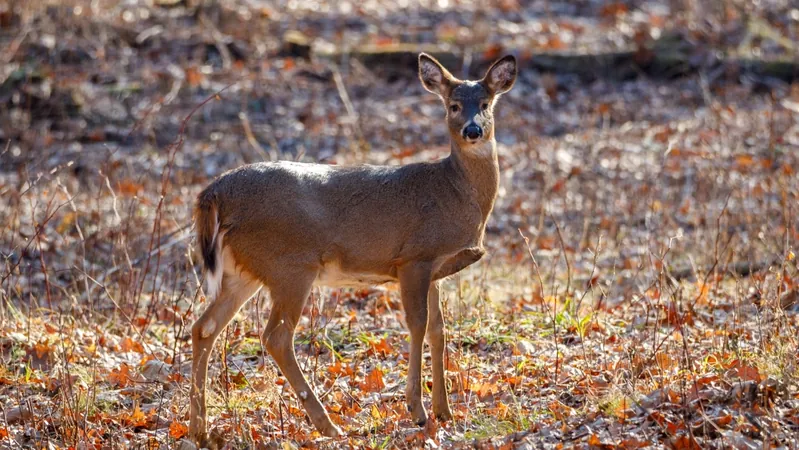
Alarming Spread of 'Zombie Deer' Disease in British Columbia's Kootenays: Urgent Action Required!
2024-12-03
Author: Benjamin
Health Officials Confirm Fourth Case of CWD
Health officials have confirmed a troubling fourth case of chronic wasting disease (CWD), commonly referred to as 'zombie deer' disease, in the Kootenay region of British Columbia. This latest case was identified in a white-tailed deer harvested by a hunter in October near Cranbrook, raising significant concerns about the potential for further spread of this debilitating disease.
Caution Advised for Meat Consumption
The Ministry of Water, Land, and Resource Stewardship reported that while there is no "direct evidence" of CWD transmission to humans, they urgently advise against consuming meat from infected animals. Disturbingly, cooking methods cannot eliminate the abnormal proteins responsible for the disease, which could pose a risk to hunters and their families.
Symptoms and Impact of CWD
CWD is characterized by severe neurological symptoms in deer, leading to drastic weight loss, excessive drooling, lack of coordination, and abnormal behavior reminiscent of 'zombie' states. It has been known to affect other cervids, including elk, moose, and caribou, causing alarm among wildlife officials.
Trends in CWD Cases in B.C.
B.C.'s first cases of CWD emerged in January, confirmed by the Canadian Food Inspection Agency. The initial cases included both mule and white-tailed deer, with the most recent discovery highlighting a troubling trend in infection. All confirmed instances have emerged from the same area around Cranbrook, prompting fears of an outbreak.
Urgent Action Recommended
Despite the testing of over 3,000 animal samples this year, illustrating a relatively low prevalence of the disease, experts are urging immediate action. The B.C. Wildlife Federation is advocating for a cull to curb the spread, stating that urban deer populations—with their close quarters and high density—are particularly vulnerable to transmitting the disease. BCWF executive director Jesse Zeman emphasized that "city deer" could become significant vectors for the pathogen, especially since infected animals might not show symptoms for months or even years.
Monitoring and Reporting
Officials are gathering data and closely monitoring the situation, with the collaboration of First Nations, stakeholders, and the hunting community being crucial in efforts to manage and mitigate this public health concern. Hunters and residents who spot any deer showing signs of illness are encouraged to report their observations to B.C.'s Report All Poachers and Polluters hotline at 1-877-952-7277.
Ongoing Research and Updates
As scientific studies continue to unravel the complexities of chronic wasting disease and its implications, all eyes are on B.C. to implement effective preventative measures to address this emerging threat to both wildlife and human health. Stay tuned for more updates as this situation develops!









 Brasil (PT)
Brasil (PT)
 Canada (EN)
Canada (EN)
 Chile (ES)
Chile (ES)
 España (ES)
España (ES)
 France (FR)
France (FR)
 Hong Kong (EN)
Hong Kong (EN)
 Italia (IT)
Italia (IT)
 日本 (JA)
日本 (JA)
 Magyarország (HU)
Magyarország (HU)
 Norge (NO)
Norge (NO)
 Polska (PL)
Polska (PL)
 Schweiz (DE)
Schweiz (DE)
 Singapore (EN)
Singapore (EN)
 Sverige (SV)
Sverige (SV)
 Suomi (FI)
Suomi (FI)
 Türkiye (TR)
Türkiye (TR)